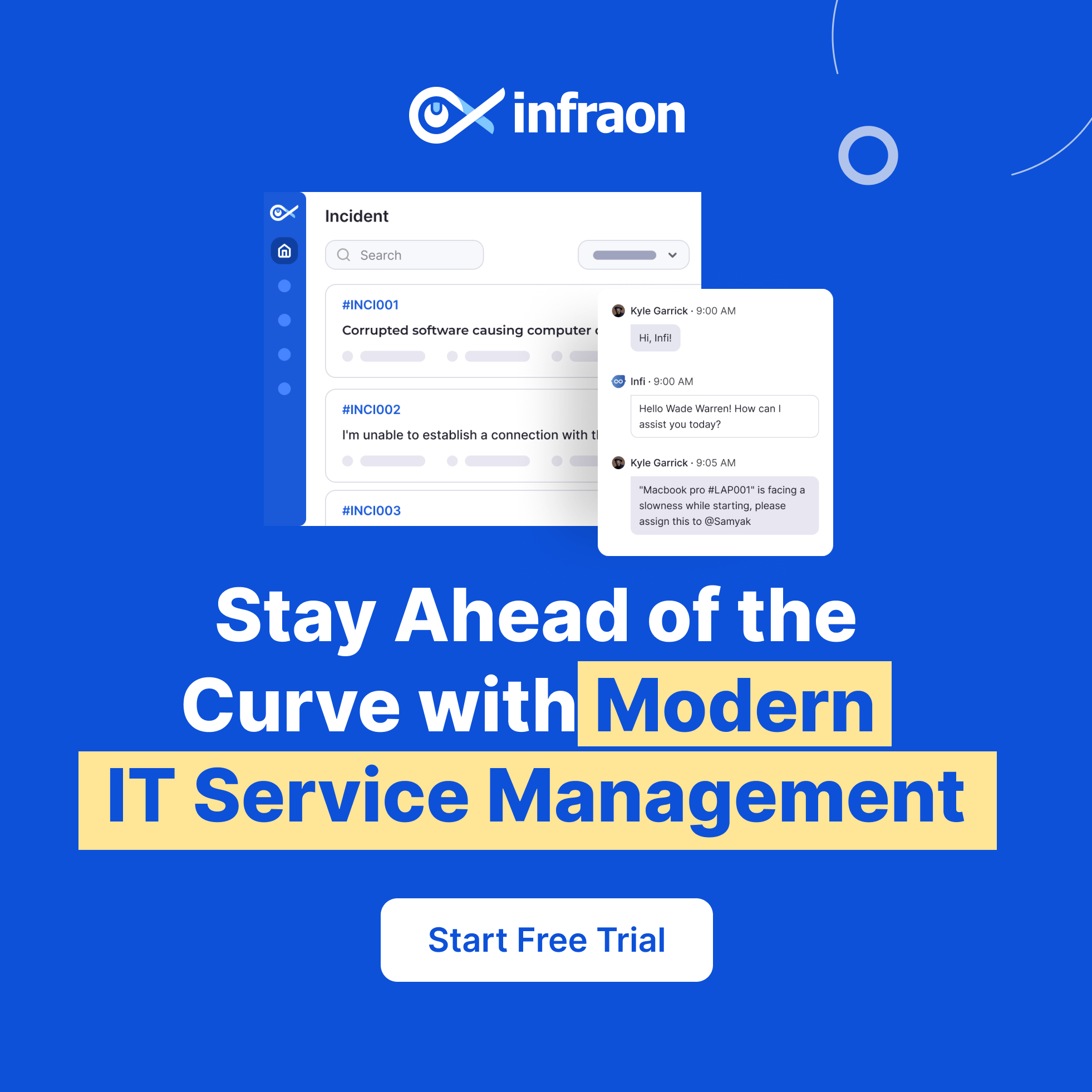Choosing the perfect ITSM solution is crucial for organizations as it directly impacts their operational efficiency, customer satisfaction, compliance adherence, and continuous improvement efforts. Organizations can optimize their IT operations, enhance service quality, and stay competitive in a digital world by selecting a solution that aligns with the organization’s specific needs and goals.
Related blog: Zendesk vs Atlassian vs Infraon in 2023
Let’s explore the significance of making the right choice for ITSM Solutions:
- Streamlining IT operations: An effective ITSM solution helps organizations streamline their IT operations by providing a structured framework for managing and resolving incidents, problems, and changes. It automates and standardizes processes, ensuring efficient workflows and reducing the risk of errors or delays. As a result, it leads to improved productivity, reduced downtime, and enhanced service delivery.
- Enhancing user satisfaction: ITSM solutions are vital in delivering exceptional service experiences. Organizations can resolve issues promptly by providing a self-service portal, a comprehensive knowledge base, and efficient incident management, empowering users to find solutions independently, and ensuring consistent service quality. It results in higher user satisfaction levels and strengthens the overall reputation of the organization.

- Optimizing resource allocation: With the right ITSM solution, organizations can optimize resource allocation by tracking and managing incidents, problems, and changes. It provides visibility into the workload of IT teams, enabling better allocation of resources based on priority and urgency. Organizations can maximize efficiency and productivity by ensuring that the right resources are assigned to the right tasks.
- Ensuring compliance and governance: ITSM solutions help organizations adhere to compliance regulations and governance frameworks. They provide tools for tracking and managing assets, configurations, and changes, ensuring that processes are documented, controlled, and auditable. This reduces the risk of non-compliance and helps organizations maintain transparency and accountability in their IT operations.
- Facilitating continuous improvement: The perfect ITSM solution offers robust reporting and analytics capabilities, providing insights into key performance indicators, trends, and areas for improvement. Organizations can identify bottlenecks, analyze data to make data-driven decisions, and implement continuous improvement initiatives. So, it fosters a culture of ongoing optimization, allowing organizations to adapt to evolving business needs and deliver better services over time.
- Scalability and flexibility: ITSM solutions that are scalable and flexible enable organizations to grow and adapt to changing business requirements. As organizations expand or undergo digital transformations, their ITSM solution should be able to accommodate increased demand, handle new processes, and integrate with other systems seamlessly. Scalability and flexibility ensure that the chosen solution can evolve with the organization, avoiding the need for disruptive migrations or investments in new platforms.
Atlassian vs. ServiceNow vs. Infraon
As you may know, Atlassian, ServiceNow, and Infraon are three prominent players in the ITSM market, each offering unique features and capabilities. In this comprehensive analysis, we will delve into the details of these platforms to help you decide when choosing the right ITSM solution for your organization.
Atlassian

Atlassian, a renowned software company, provides various collaborative tools to enhance team productivity. Their ITSM solution, Jira Service Management, focuses on delivering exceptional customer service experiences. Jira Service Management integrates seamlessly with other Atlassian products like Jira Software, Confluence, and Bitbucket, offering a comprehensive suite of tools for IT teams.
Key features of Atlassian:
- Incident Management: Jira Service Management allows efficient tracking, managing, and resolving incidents. It provides a user-friendly interface and automation capabilities to ensure prompt incident resolution.
- Change Management: With Jira Service Management, organizations can implement change management processes, ensuring that changes are properly planned, assessed, and approved before implementation.
- Service Catalog: Atlassian enables the creation of a service catalog to document and manage IT services, allowing users to request services easily.
Pros of Atlassian:
- Integration with other Atlassian tools provides a seamless workflow for development and IT teams, fostering collaboration and productivity.
- User-friendly interface and customization options make it easy to adapt to organizational needs and preferences.
- Active and supportive community with a vast range of plugins and extensions available, enhancing the platform’s functionality.
ServiceNow

ServiceNow is a leading ITSM platform known for its robust suite of tools and extensive capabilities. The platform offers a comprehensive range of modules beyond ITSM, including IT operations management, HR service delivery, and customer service management.
Key features of ServiceNow:
- Incident Management: ServiceNow provides a centralized platform to track, manage, and resolve incidents efficiently. It offers intelligent automation capabilities, ensuring speedy incident resolution.
- Configuration Management Database (CMDB): ServiceNow’s CMDB allows organizations to maintain a comprehensive inventory of IT assets and their relationships, facilitating accurate change management and asset tracking.
- Self-Service Portal: ServiceNow’s self-service portal empowers users to find answers, submit requests, and track progress independently, reducing the workload on IT teams.
Pros of ServiceNow:
- Robust ITSM capabilities with a comprehensive suite of tools for various business functions, enabling organizations to consolidate their IT and service management operations.
- Extensive customization options to tailor the platform to specific organizational requirements, ensuring scalability and flexibility.
- Strong reporting and analytics capabilities for data-driven decision-making, empowering organizations to gain insights into their IT processes and performance.
Infraon
Infraon is a growing player in the ITSM market, offering a scalable and agile platform for organizations of all sizes. Their solution focuses on simplifying IT service management processes and enhancing overall operational efficiency.

Key features of Infraon:
- Incident and Problem Management: Infraon enables efficient tracking, managing, and resolving incidents and problems. It provides automated workflows and collaboration tools to streamline incident resolution.
- Knowledge Management: Infraon offers a robust knowledge base system, allowing organizations to create, manage, and share knowledge articles to facilitate self-service and enhance problem resolution.
- SLA Management: Infraon provides comprehensive service level agreement (SLA) management capabilities, ensuring service commitments are met and customer expectations are exceeded.
Pros of Infraon:
- User-friendly interface with intuitive navigation, making it easy for users to adopt and utilize the platform without extensive training.
- Competitive pricing structure, making it an attractive option for small and mid-sized organizations with budget constraints.
- Extensive customization options to align with specific business processes and requirements, providing flexibility and scalability.
Related article: Ivanti Neurons for ITSM Pricing 2023
Conclusion
Choosing the right ITSM solution requires a careful evaluation of an organization’s specific requirements, budget constraints, and existing IT infrastructure. Atlassian, ServiceNow, and Infraon offer unique strengths and capabilities to meet various business needs.
To make an informed decision, organizations must thoroughly evaluate each platform, engage with demos, and seek input from stakeholders. Consider factors such as organizational size, complexity of IT processes, budget, and integration requirements.
By carefully considering these factors, you can select the ITSM solution that best aligns with your objectives, enhancing productivity, efficiency, and user satisfaction in the long run.
Remember, choosing the right ITSM solution is a critical decision that will impact your organization’s operations and customer experiences. So take the time to assess your needs, explore the capabilities of each platform, and make an informed choice that aligns with your business goals.























